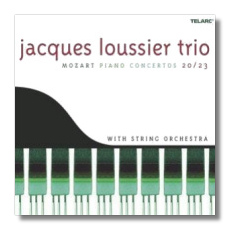
The Internet's Premier Classical Music Source
Related Links
- Mozart Reviews
- Latest Reviews
- More Reviews
-
By Composer
-
Collections
DVD & Blu-ray
Books
Concert Reviews
Articles/Interviews
Software
Audio
Search Amazon
Recommended Links
Site News
 CD Review
CD Review
Wolfgang Mozart

Arranged by Jacques Loussier
- Piano Concerto #20 in D minor, K. 466
- Piano Concerto #23 in A Major, K. 488
Jacques Loussier Trio
(Jacques Loussier, piano; Benoit Dunoyer de Segonzac, bass; André Arpino, drums)
String Orchestra
Telarc CD-83628 DDD 59:22
Jazz pianist Jacques Loussier started to acquire a following in the late 1950s with his series of Play Bach LPs – a synthesis of Bach and jazz musicianship that still seems pretty hip today. In recent years, Loussier and the other members of his Trio – not the original ones – have been associated with the Telarc label, and they are continuing to blend jazz and classical music – not just Bach and other Baroque composers, but also Satie, Ravel, and others. Now Mozart gets his turn, just in time to celebrate his 250th birthday!
The booklet notes remind us that jazz pianists such as Chick Corea and Keith Jarrett have not ignored Mozart's piano concertos, although they usually confined their experiments to the cadenzas. Vocalist Bobby McFerrin also has put his own rather odd imprint on this repertoire. Loussier appears to be the first jazz musician to transform Mozart's music completely, however. While Mozart's music never disappears in these arrangements, Loussier is not afraid to take liberties with it in order to make it work. The outlines are all there, but many of the details have been changed.
The Concerto #20 has the reputation of being a dramatic, even tragic work, and I was unsure how well it would work in a jazz arrangement. I'm not convinced by Loussier's treatment of the first movement. Instead of a synthesis, what we hear strikes me as more of a slightly uncomfortable alternation of styles, or as "shoehorning," if you will. The second movement, with its deliciously swooning melody, also has difficulties finding its feet, although Loussier starts to get things off the ground in the movement's stormy middle section. Finally, in the third movement, the Trio finds its groove, and one is convinced after all that Mozart had a little jazz "cat" inside him waiting to come out. The Concerto #23 is much more amenable to being rethought in this way; it is not such a serious work. All three movements work very well, even though there are a few episodes in which the synthesis feels forced, not natural. I should add that the essence of jazz is improvisation, and that although improvisation probably was at the start of what hears on this CD, I suspect that by the time the final sessions took place, there was little room for spontaneity. Even with an overlay of jazz, Mozart's music is like a cleverly constructed jigsaw puzzle, and it is not easy to take something away, add something, or change something without forethought.
This time around, Loussier has broken precedent by adding a group of "back-up" musicians – an ensemble of 12 strings – to this recording. This allows him to preserve some of the concertante feel of Mozart's originals, even Loussier has removed the woodwinds and brass from Mozart's scoring. They play "straight," leaving the jazz innovations to the Trio.
This is not the most successful of Loussier's CDs – a set of variations on the second movement from Beethoven's Seventh Symphony (Telarc CD-83580) is superior – but it will intrigue open-minded listeners on either side of fence. The recording was made in Paris in June 2005. The Trio will tour with this repertoire in 2006.
Copyright © 2006, Raymond Tuttle




















